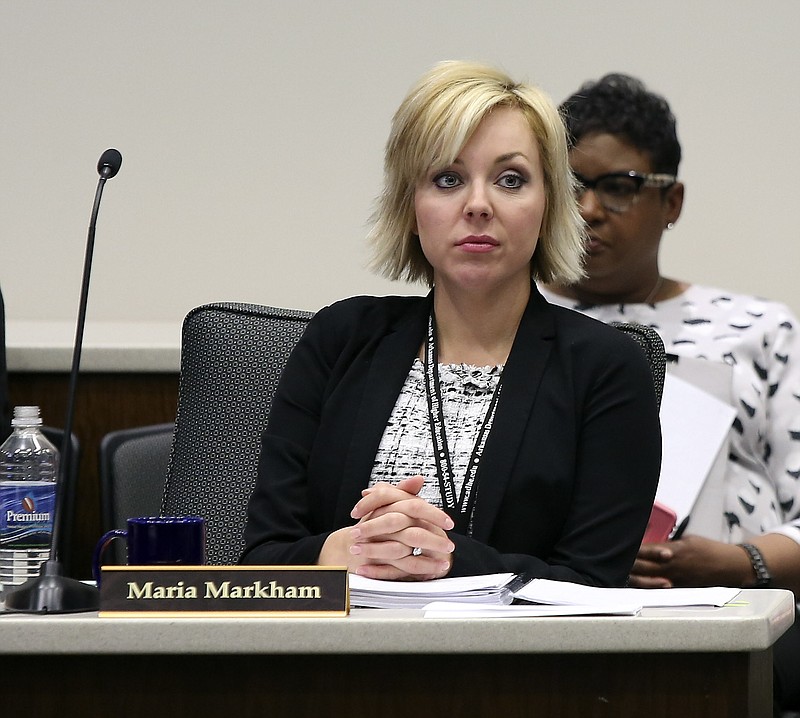Maria Markham, director of the Arkansas Division of Higher Education for 6½ years, learned suddenly her tenure was over Tuesday afternoon.
"I got a call from the governor's office saying they were going in another direction and thanking me for my service, [but] no cause or explanation," Markham said. "I was not expecting that."
Markham said she understands that when regimes change, new administrations -- Gov. Sarah Huckabee Sanders took office in January following her election in November -- often want different people in various roles. But when many of those appointments were made with Markham hearing nothing about a change in her status, she expected to remain in her role, at least for the immediate future, Markham said.
"The timing was a surprise, [especially] in the middle of the legislative session" -- and particularly as Markham's current "top priority" works its way through the Legislature.
The "No. 1" priority of Markham's is the Arkansas Challenge Plus Scholarship, she said. If that "big one" became law, "I'd call it a win, [because] the most important thing we can do is provide affordable education for students," especially those of lower socioeconomic status.
A joint committee of state senators and representatives approved a bill earlier this month that would amend the Arkansas Academic Challenge Scholarship to include additional funds for students based on their financial needs.
The state would use the Free Application for Federal Student Aid -- commonly known as FAFSA -- to determine eligibility for the Challenge Plus Scholarship, with students receiving up to $5,000 on a "sliding scale" based on need, according to Markham. "We use the same calculation the federal government uses to calculate Pell awards, and we would increase the award amount for our students with the most need."
Under the Academic Challenge Scholarship, which is funded by the lottery and $20 million in general revenue funds, students are awarded funds based on their year in college, with freshmen attending four-year institutions awarded $1,000, sophomores and juniors awarded $4,000, and seniors eligible for $5,000 from the scholarship program. Freshmen attending a two-year college can receive $1,000, with sophomores awarded $3,000.
The scholarship is open to students regardless of their financial need, and during the 2021 legislative session, then-Gov. Asa Hutchinson proposed creating a needs-based scholarship program.
Senate Bill 248, sponsored by Sen. Jane English, R-North Little Rock, is based on the previous proposal, with the scholarship open to traditional and nontraditional students. To be eligible for the scholarship, students must score at least a 19 on the ACT college entrance exam or an equivalent score on a similar test.
The Division of Higher Education has awarded challenge scholarships to 28,421 students in fiscal year 2023 totaling $53.5 million, according to Nick Fuller, the division's assistant director of finance. In the previous fiscal year, the division awarded $75.1 million in scholarships to 28,716 students.
The proposed Challenge Plus Scholarship would be funded by excess lottery proceeds, according to an estimate from the Department of Finance and Administration. How much the Department of Education would distribute to scholarship students each year would be contingent upon lottery revenue that funds the state's various academic scholarships.
Getting the Challenge Plus Scholarship across the finish line would be a third signature accomplishment of Markham's tenure with the Division of Higher Education, joining the creation of productivity funding for the state's colleges and universities and the Arkansas Future program, she said Wednesday. "I'm really proud of both of those."
Though imperfect, productivity funding -- a mechanism to align institutional funding with statewide priorities for higher education by incentivizing progress toward statewide goals in the areas of efficiency, effectiveness, affordability, and adjustments -- "is a national model that's been praised by other states and lots of organizations," she said. The ArFuture grant applies to students enrolled in Science, Technology, Engineering, and Math (STEM) fields or regional high-demand areas of study and covers tuition and fees for qualifying certificate and associate degree programs at the state's public institutions for eligible students.
Markham became head of the state Higher Education office as director in July 2016; before that, she spent 11 years as vice chancellor of Cossatot Community College of the University of Arkansas. In 2019, Markham was appointed by Hutchinson to represent Arkansas as a commissioner for the Education Commission of the States.
"We appreciate Dr. Markham's leadership and tenure as director," said Kimberly Mundell, director of communications for the Arkansas Department of Education. "We wish her well on the next phase of her career."
Alexa Henning, communications director for the governor's office, said they have no announcements at this time regarding Markham's successor. She said that Sanders appreciates Markham's service "and wishes her well in her future endeavors."
Markham has a bachelor's degree in marketing and her MBA, both from Henderson State University. Later, she received her Ph.D. in business with a specialization in organizational leadership from Northcentral University. In 2016, she was named as one of the state's 40 Under 40 most Intriguing Business and Political Leaders and -- the following year -- to the 200 Deal Makers by Arkansas Business.
Markham is "going to take a little time, now, to think about what's next," but she knows she'll stay in higher education, where she's spent her career, as "I'm a policy expert in higher education," she said. She could return to work at an individual college or university -- she also worked for her alma mater, in addition to Cossatot Community College of the University of Arkansas -- but she'll examine "the environment in higher education" before finalizing any decision.
The Arkansas Democrat-Gazette reached out to the Arkansas Department of Education/Higher Education division and Greg Revels -- current chairman of the Arkansas Higher Education Coordinating Board -- for comments, but none responded.
Information for this article was contributed by Neal Earley of the Arkansas Democrat-Gazette.
